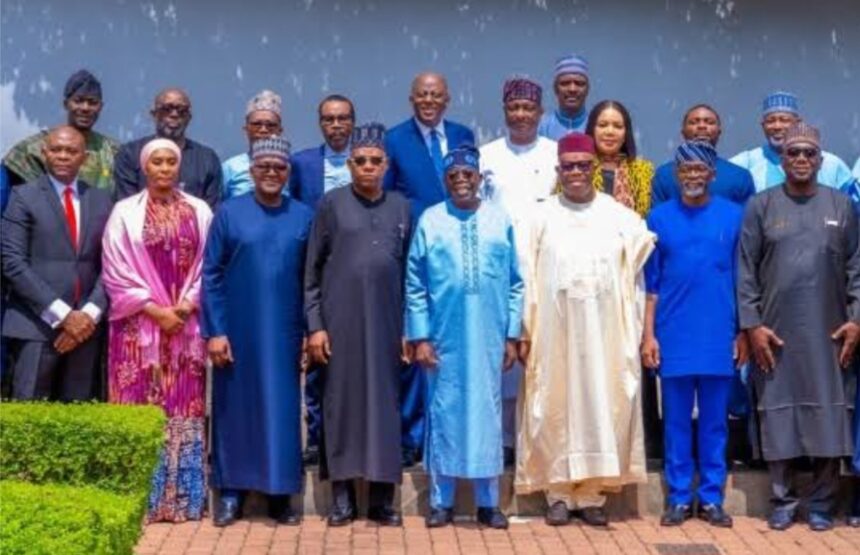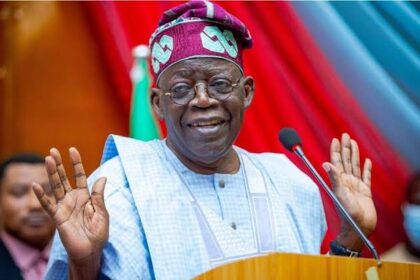– Nigerians Call for Fresh Blood
Can old wine taste better if dispensed from a new bottle? The answer may lie in the grand mosaic of President Bola Ahmed Tinubu’s National Economic Committee (NEC). Tinubu urges Nigerians to trust his instincts even as pundits describe his newly constituted NEC as a firebird moulded from the ashes of past administrations.
The familiar faces of Aliko Dangote, Tony Elumelu, and Bismarck Rewane stand as titans of industry, their presence both a beacon of hope and a haunting reminder of promises unmet. The streets hum with anticipation, and the air is thick with the scent of possibility—yet, beneath the veneer of optimism, a whisper of doubt persists: can these old titans breathe new life into a dream deferred?
Looking at the team, a familiar pattern re-emerges with a flourish. Yet, amidst the fanfare, a whisper of doubt lingers: Can the same men who have trodden this path before weave a different destiny for Nigeria’s beleaguered economy?
The stage is set, the players are ready, and the stakes could not be higher. But for many Nigerians, the scene evokes a sense of déjà vu. They have seen these figures before, heard the promises, and lived through the cycles of hope and despair. The question looms large: Can Tinubu’s team break this relentless cycle and deliver real, tangible change?
As the country stands at a crossroads, the expectations are immense. The NEC’s mission is daunting—revitalize an economy crippled by years of mismanagement, corruption, and global economic shifts. It’s a Herculean task, demanding not just experience but also innovative thinking, bold strategies, and an unwavering commitment to the greater good.

A Dance of Titans: Familiar Faces, Familiar Places
When President Tinubu took the helm and unveiled his economic dream team, the roster glittered with names that have become synonymous with Nigerian commerce. Aliko Dangote, Tony Elumelu, Bismarck Rewane—each a titan in their own right, yet each a veteran of this very stage under previous administrations. The spectacle was grand, the promise immense, but for many Nigerians, it felt like a cinematic rerun.
These are men whose business acumen has built empires and whose decisions have rippled across the African continent. Their inclusion in Tinubu’s NEC is not without merit—they bring invaluable expertise and a proven track record of success. However, their presence also underscores a glaring issue: the recycling of elite power structures that have historically maintained the status quo.
For a nation yearning for fresh ideas and transformative policies, this familiarity breeds skepticism. The challenges Nigeria faces today are unprecedented, and they require solutions that break away from traditional molds. By relying on the same faces, there is a palpable fear that Tinubu’s administration may fall into the same patterns of incremental progress that have characterized past regimes, rather than achieving the bold strides needed to uplift the nation.
The Great Businessmen and the Stagnant Economy
“Don’t get it wrong,” they say, “these men are the best in the business.” Indeed, Dangote’s empire spans continents, Elumelu’s influence reshapes banking, and Rewane’s insights are sought after in financial circles. Yet, for all their prowess, the Nigerian economy remains a puzzle unsolved, a promise unfulfilled. The streets of Lagos, the fields of Kano, the oil rigs of the Delta—they whisper a common refrain: “We need more. We need new.”
The credentials of these businessmen are beyond reproach. They have built conglomerates, driven economic growth, and created jobs. Yet, their success stories are juxtaposed against a national backdrop of economic instability, widespread poverty, and a yawning gap between the wealthy elite and the struggling masses. This dichotomy raises a critical question: Can those who have thrived within the existing economic framework truly disrupt it to benefit the broader populace?
The NEC’s challenge is to bridge this gap, to translate boardroom success into grassroots prosperity. This requires a paradigm shift—moving from policies that favor large-scale enterprises to those that empower small businesses, stimulate local economies, and create sustainable development across all sectors. The real test for Tinubu’s team will be their ability to adapt their business acumen to serve the needs of the many, rather than the few.
Echoes of February: The Early Promises
Back in February 2024, Tinubu’s announcement of an economic advisory committee was met with cautious optimism. The inclusion of these business heavyweights was seen as a strategic masterstroke. Their task? To chart a course out of economic turmoil. Months later, as the NEC stands poised to execute an ambitious N2 trillion recovery package, the question remains—will this be different?
The initial optimism was not misplaced. Tinubu’s proactive approach and the assembly of such a formidable team signaled a commitment to tackling Nigeria’s economic woes head-on. The detailed economic marshal plan unveiled then was comprehensive, addressing key areas such as agriculture, energy, and social welfare. The anticipation was palpable; could this be the turning point Nigeria desperately needed?
However, as the months passed, the execution of these plans has become the focal point. The success of the NEC hinges on its ability to deliver on its promises swiftly and effectively. The N2 trillion recovery package is a significant investment, but its impact will only be felt if it reaches the intended beneficiaries—ordinary Nigerians. The clock is ticking, and the nation watches closely, hopeful yet wary.
Voices of Discontent: A Nation’s Lament
From the bustling markets of Lagos to the serene farmlands of Jos, the murmurs of discontent grow louder. Nigerians, weary of recycled promises, demand innovation. “We expected more from Tinubu,” says Aisha, a market trader in Abuja. “We needed a visionary, not a replay of past administrations.”
The disillusionment is not unfounded. For decades, Nigerians have endured economic policies that promised much but delivered little. The cyclical nature of hope and disappointment has eroded trust in political leaders. Tinubu’s administration, despite its early promises, is at risk of being seen as just another chapter in this ongoing saga unless it can demonstrate a clear departure from the past.
This sentiment is echoed across various sectors of society. Students, farmers, traders, and professionals alike are unified in their call for substantive change. They seek leaders who not only understand their struggles but are also willing to break away from conventional approaches to create a more inclusive and equitable economy. Tinubu’s ability to meet these expectations will define his presidency and potentially reshape Nigeria’s future.
Pundits Call for Fresh Blood
Economic analysts and small business owners alike voice a shared concern: the need for fresh perspectives. “It’s time to look beyond the old guard,” says Chike Obi, an economist. “Bringing in young, dynamic thinkers can inject the innovation and agility that our economy desperately needs.”
The call for fresh blood is more than a mere desire for new faces; it is a plea for new ideas and approaches that can address the unique challenges of the 21st century. Younger economists and business leaders bring with them a different perspective—one that is often more attuned to technological advancements, sustainable development, and social entrepreneurship.
Furthermore, involving a younger generation in economic policymaking can foster a sense of ownership and responsibility among Nigeria’s youth, who represent a significant portion of the population. Their active participation in shaping economic policies can drive innovation, enhance economic resilience, and create a more dynamic and forward-thinking economic landscape.
A Dissonant Melody: Billionaires and the Bigger Picture
The irony is stark—entrusting the nation’s economic revival to billionaire capitalists who, critics argue, are more likely to protect their own interests than champion the public good. “It’s inappropriate,” states Musa, a small-scale entrepreneur. “These men are too entrenched in the status quo to enact real change.”
This perspective highlights a fundamental conflict of interest. Billionaires, by their very nature, operate within a framework that prioritizes profit. While their expertise is invaluable in understanding market dynamics, their ability to empathize with and address the needs of the broader population is often questioned. Critics argue that their policies may inadvertently widen the gap between the rich and the poor.
For true economic transformation, there must be a balance between leveraging the expertise of successful business leaders and ensuring that the voices and needs of the average Nigerian are represented. This requires a more diverse NEC, one that includes not just business magnates but also representatives from civil society, academia, and grassroots organizations who can advocate for policies that promote inclusive growth and social equity.
Tinubu’s Crossroads: The Path Forward
As President Tinubu navigates this critical juncture, the stakes could not be higher. His administration’s legacy hinges on the success of this economic council. Will he heed the calls for broader representation and innovative thinking? Or will he continue to lean on the comfort of the familiar, hoping that this time, the outcome will be different?
The path forward for Tinubu is fraught with challenges but also ripe with opportunities. By embracing a more inclusive approach to economic policymaking, he can harness the collective wisdom of a diverse group of advisors. This would not only enhance the credibility of his administration but also increase the likelihood of developing policies that are both effective and equitable.
Ultimately, Tinubu’s leadership will be judged by his ability to transcend traditional power structures and foster a culture of innovation and inclusivity. The decisions he makes in the coming months will determine whether his administration will be remembered as a catalyst for change or as another missed opportunity in Nigeria’s quest for economic stability and growth.
A Nation in Waiting
Nigeria waits with bated breath, caught in the tension between hope and skepticism. The people yearn for a change that goes beyond the names in power, seeking a future that truly reflects the promise of their potential. The NEC’s success hinges on its ability to deliver real, measurable improvements in the lives of everyday Nigerians. It is a monumental task, but with bold leadership and a willingness to innovate, it is a challenge that can be met.
As the nation watches, there is a sense of cautious optimism. Nigerians are ready to support their leaders, but they demand transparency, accountability, and above all, results. The road to economic recovery is long and arduous, but with the right mix of vision, expertise, and determination, there is hope that Tinubu’s administration can lead Nigeria to a brighter, more prosperous future.
The inauguration of the National Economic Committee marks a pivotal moment. Yet, the true test lies ahead. Can Tinubu and his team break free from the shadows of the past and carve a new path to prosperity? Or will this be another chapter in the long saga of unmet expectations? Only time will tell.



